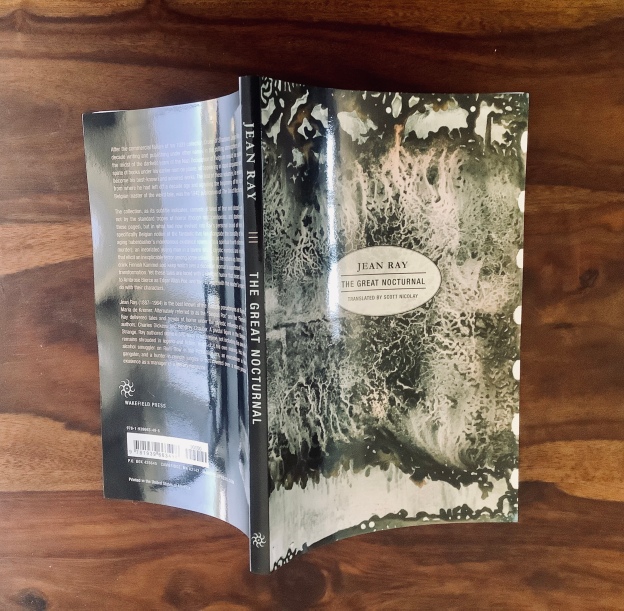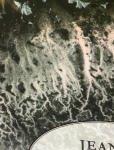“The Great Nocturnal — Jean Ray”
The
Great Nocturnal — Jean Ray
Wakefield Press 2020
Translated by Scott Nicolay
My previous reviews of Jean Ray: https://dflewisreviews.wordpress.com/tag/jean-ray/
and Scott Nicolay: https://dflewisreviews.wordpress.com/tag/scott-nicolay/
My other reviews of older or classic books: https://dflewisreviews.wordpress.com/reviews-of-older-books/
When I read this book, my thoughts will appear in the comment stream
below…
Cruise of Shadows - Jean RayIn "jean
ray"
THE SEVEN CASTLES OF THE SEA KING
“: sick by the spirit of imitation.”
After reading this astonishing work I somehow felt a whole curse pass through me simply by dint of typing out this story’s title above! It is as if by absorbing a literary gestalt you can BECOME it, as if sea-sickness is catching, like plagues that come in first, second and third waves… perhaps more.
This is such a sea story as told from the drunken ambiance of the Phare Amusant tavern, and a man’s chalk drawings and his knowledge of the numbers of castles of the sea king, seven or sixteen? And the Hawaiian Bird and its cage. And the lockdown of a human prison that suddenly stops this story as if gratuitously, but I sense it is more than just gratuitously, not even obliquely with a petty thief, for the sudden stop is a way to stop us reading it… to stop us absorbing it! Whether that was the freehold author or leasehold translator, or both, I give thanks. I am being half-serious.
As a side issue, this story is objectively another fine example of what I described above “as a continental counterpart to that in the dialogue-crepitating impressionism of people and things as written by Katherine Mansfield…”
This is such a sea story as told from the drunken ambiance of the Phare Amusant tavern, and a man’s chalk drawings and his knowledge of the numbers of castles of the sea king, seven or sixteen? And the Hawaiian Bird and its cage. And the lockdown of a human prison that suddenly stops this story as if gratuitously, but I sense it is more than just gratuitously, not even obliquely with a petty thief, for the sudden stop is a way to stop us reading it… to stop us absorbing it! Whether that was the freehold author or leasehold translator, or both, I give thanks. I am being half-serious.
As a side issue, this story is objectively another fine example of what I described above “as a continental counterpart to that in the dialogue-crepitating impressionism of people and things as written by Katherine Mansfield…”
 THE PHANTOM IN THE HOLD
THE PHANTOM IN THE HOLD
“‘Gentleman,’ he said, ‘We are about to relate a tale that does not concern you.’”
Yet, I feel drawn in by mention of Sheerness which is not far across a certain quarter of the sea from where I live on the Essex coast, but I bow to your wishes and go further afield nearer the exit door so that I at least LOOK as if I am not absorbing this tale being told inside this built-up tavern ambiance that I have set up around me, imaginatively, in my own reading room!
I relished what I surreptitiously heard about this story, full of grog, of winches and whistles. A fulminating ship where would-be drunk with a “pig of a German friend” is developed to rifle together the hold’s whiskey supplies on board. And amid surrounding “laughing silence […] horrible as a mask”, there is a terrifying terror (not all terror warrants the word terrifying, but this one does!), a dog or pig or a finger become green hand, later to be palmed off as mere phosphorous, but I don’t believe that. The terror WAS a terror. No rubbish spouted here. “I drank, drank, drank;” amid abundant rodents, a skeleton of green fire, ‘arrayed on tiers of darkness.’
And amid surrounding “laughing silence […] horrible as a mask”, there is a terrifying terror (not all terror warrants the word terrifying, but this one does!), a dog or pig or a finger become green hand, later to be palmed off as mere phosphorous, but I don’t believe that. The terror WAS a terror. No rubbish spouted here. “I drank, drank, drank;” amid abundant rodents, a skeleton of green fire, ‘arrayed on tiers of darkness.’
I believe as far as I could tell this is a fair summary. No doubt, any doubt about my hearing increases that terror. Such enforced social distancing affecting my hearing more than any lack of my inherent comprehension, I avow.
I relished what I surreptitiously heard about this story, full of grog, of winches and whistles. A fulminating ship where would-be drunk with a “pig of a German friend” is developed to rifle together the hold’s whiskey supplies on board.
 And amid surrounding “laughing silence […] horrible as a mask”, there is a terrifying terror (not all terror warrants the word terrifying, but this one does!), a dog or pig or a finger become green hand, later to be palmed off as mere phosphorous, but I don’t believe that. The terror WAS a terror. No rubbish spouted here. “I drank, drank, drank;” amid abundant rodents, a skeleton of green fire, ‘arrayed on tiers of darkness.’
And amid surrounding “laughing silence […] horrible as a mask”, there is a terrifying terror (not all terror warrants the word terrifying, but this one does!), a dog or pig or a finger become green hand, later to be palmed off as mere phosphorous, but I don’t believe that. The terror WAS a terror. No rubbish spouted here. “I drank, drank, drank;” amid abundant rodents, a skeleton of green fire, ‘arrayed on tiers of darkness.’I believe as far as I could tell this is a fair summary. No doubt, any doubt about my hearing increases that terror. Such enforced social distancing affecting my hearing more than any lack of my inherent comprehension, I avow.


 This work is horror supreme at its climax, with a final musical ‘dying fall’ where hope still exists? Only you can judge. Transcending bathos as well as pathos.
This work is horror supreme at its climax, with a final musical ‘dying fall’ where hope still exists? Only you can judge. Transcending bathos as well as pathos.
I may have got this all wrong, with Des well met, or not. Caveat review-reader.